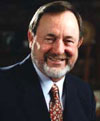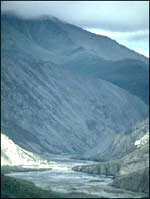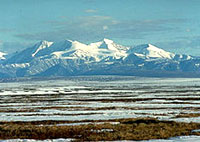Rep. Don Young (R-Alaska) flew right over the cuckoo’s nest and straight into nutville with his widely mocked decision to add “eco-terrorists” to the list of possible suspects responsible for the horrific attacks on the World Trade Center and the Pentagon.

Don Young getting restless.
For the unlucky few who missed the Alaska congressman’s appalling bloviation, here’s what he told the Anchorage Daily News: “If you watched what happened [at past protests] in Genoa, in Italy, and even in Seattle, there’s some expertise in that field. … I’m not sure they’re that dedicated but eco-terrorists — which are really based in Seattle — there’s a strong possibility that could be one of the groups.”
We can all have a good laugh — heaven knows we need it — at this inanity. But the cold reality is that the environmental movement may take a big hit in the wake of this week’s tragedy. The conventional wisdom among some green group leaders: “ANWR is toast” (referring, of course, to the Arctic National Wildlife Refuge).
If oil prices spike (and they may not) and bombs begin to rain on the Arab world (and they probably will) the thinking goes that environmentalists and aligned politicians won’t be able to resist a riptide of public sentiment in favor of jamming a diamond-sharp drill into any piece of U.S. land capable of spitting out a single drop of fuel.

Arctic Refuge river on the run.
Photo: USFWS.
Rumors flew fast on the Hill on Friday: Oil industry lobbyists were roaming the halls, making the case for immediate Arctic drilling, some said. Sen. Frank Murkowski (R-Alaska) was prepared to attach language to “every bill that moves” to open up the refuge, claimed others. (Murkowski’s office, oddly, was closed Friday afternoon.)
Meanwhile, in the halls and offices of leading environmental groups, the question was, What do we do? How, in a time of national tragedy, do you keep up the pressure on important issues and not get swept up in all the talk of political unity and national security at whatever expense?
“We are very respectful of the fact that the nation needs to be focused on the emergency at hand and respectful of the grief that hundreds of thousands of people are going through across this country,” said League of Conservation Voters President Deb Callahan.
“But we are facing a dilemma,” she continued, “because the question [of drilling in the Arctic Refuge] may be getting called more quickly than we ever dreamed. We will be looking to our allies and friends in the Senate leadership to give us signals as to when it would be appropriate to once again engage in the debate.”
One early signal came on Friday from the office of Sen. James Jeffords (I-Vt.), the chair of the Senate Environment and Public Works Committee. Told that Murkowski may be ready to let fly with the riders to open the refuge, Jeffords spokesperson Erik Smulson had this to say:
I think it would be very unwise to open the Pandora’s box. I think that it is going to be incredibly controversial, and we are not going to want to touch it during these trying times. We are going to take things slowly and prudently. The bipartisan cooperation has been unprecedented to this point and we need to make sure that goodwill remains intact.
Callahan, for her part, didn’t believe any kind of public sentiment in favor of Arctic drilling would materialize. “I believe what the country wants to see is leadership and focus,” she said. “To the extent that there is a sense that anybody is trying to move their special interest agenda by taking advantage of this tragic situation, they will ultimately hurt themselves. I think the public could in fact become quite angry if there is any attempt to take advantage.”
Another prominent environmentalist, who asked not to be identified, said the Arctic drilling issue depends mainly on what the administration does.

In need of refuge.
Photo: Alaska Wilderness League.
“Is this just Murkowski pushing this or is it Murkowski and the administration?” the prominent environmentalist asked. “If it’s just Murkowski, it’s just going to be more of the same. He tried to do this in the wake of the Gulf War and he did not succeed then. If the administration joins in, it’s going to be a much more serious threat.”
This environmentalist said it was too early to tell whether arguments that we need Arctic oil now more than ever would be effective.
“Those arguments are untested,” he said. “It’s too early to do polling in any meaningful way. Somebody took a poll right after John F. Kennedy was killed and 70 percent said they voted for him.”
Meanwhile, many enviornmentalists are buzzing about a memo allegedly penned by Sierra Club spokesman Allen Mattison, a Muckraker friend. We tried to reach Mattison on Friday evening but, like any sane human being, he had gone home by 7:00 p.m. EST. So we don’t know if he actually wrote it, and if he did, whether he would like to say anything more about it. (We also don’t know, at this late hour, whether there is any truth to the rumor that the Natural Resources Defense Council had also decided to go publicly mum in the wake of the tragedy. Anyone know?)
Unilateral Disarmament?
Here’s the Sierra Club memo (Editor’s note: Muckraker has since confirmed that the memo was indeed written by Mattison):
To: Sierra Club staff
From: Allen Mattison
Date: Sept. 12, 2001
Re: Club message change in response to national crisisIn response to the attacks on America, we are shifting our communications strategy for the immediate future. We have taken all of our ads off the air; halted our phone banks; removed any material from the web that people could perceive as anti-Bush, and are taking other steps to prevent the Sierra Club from being perceived as controversial during this crisis. We will re-evaluate as the national climate shifts.
For now, we are going to stop aggressively pushing our agenda and will cease bashing President Bush. We strongly need to avoid any perceptions that we are being disrespectful to President Bush. Now is a time for rallying together as a nation; the public will judge very harshly any groups whom they view as violating this need for unity.
If you are asked about what this terrorism does to the Sierra Club’s agenda, please respond simply by saying that right now the public needs to focus on comforting each other and strengthening our national security to deal with the crisis at hand. When debate on other issues resumes, we will rejoin those debates.

